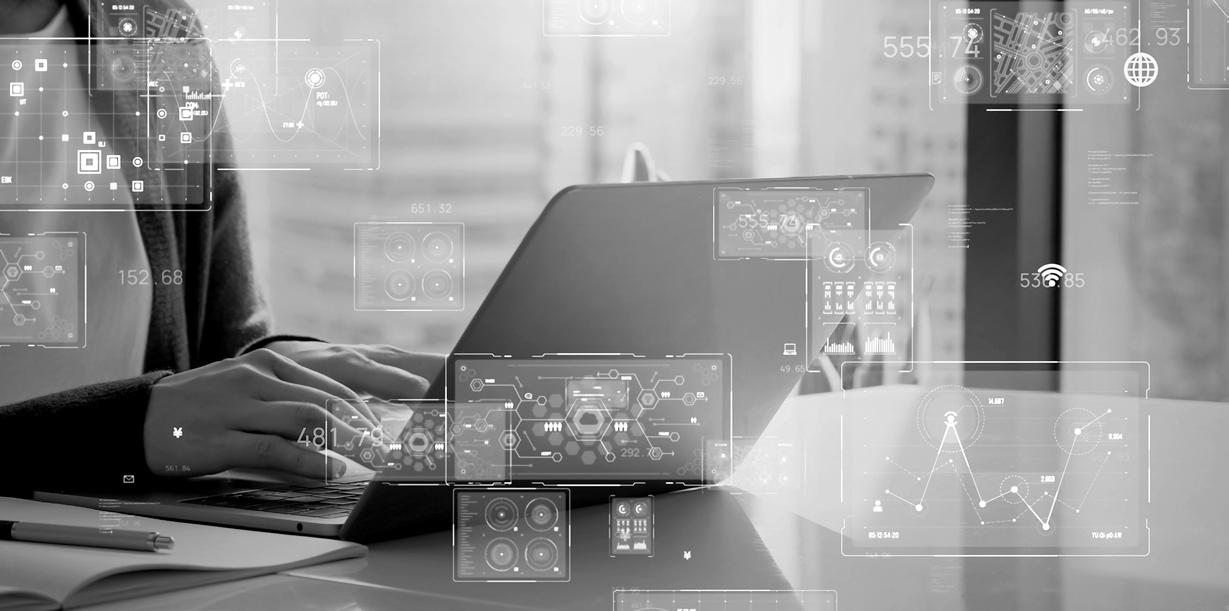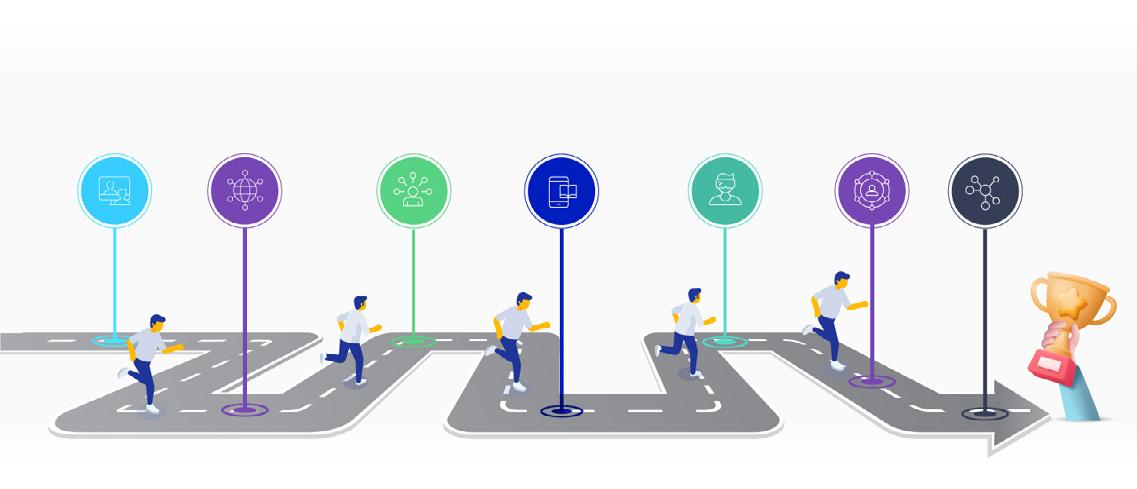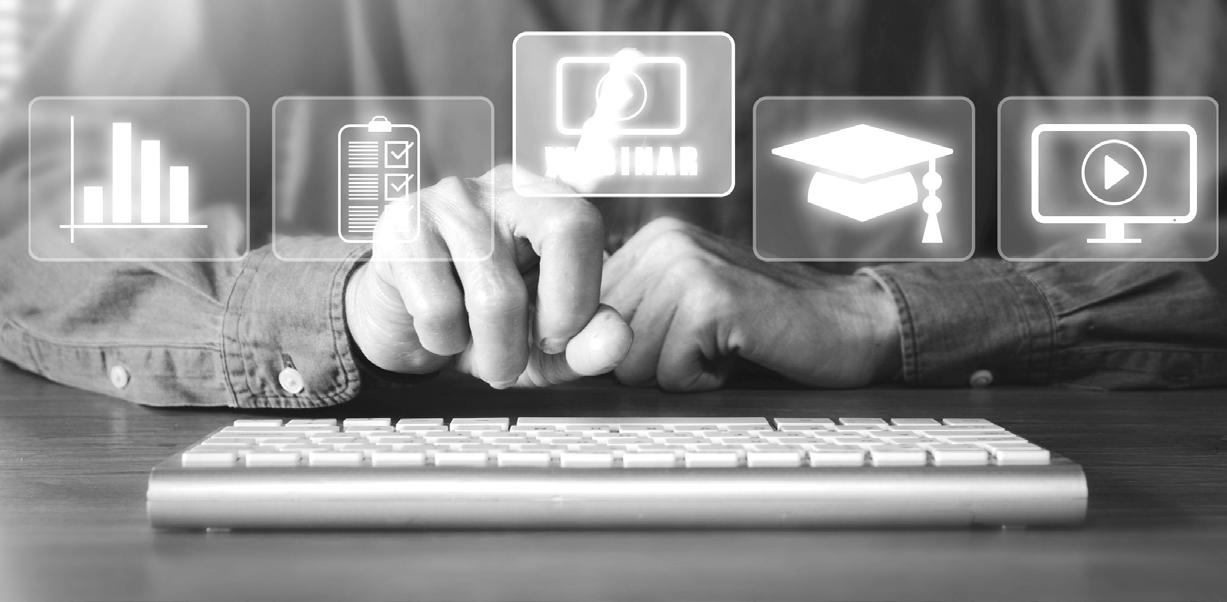
6 minute read
4.3. Scope of the strategic programs
The general scope of this first stage of the Institutional Strategy for Digital Education is shown in the following figure. The portfolio of digital learning experiences, courses, and programs with digital modalities is defined as the center of the strategy since it will integrate all the implementation moments of digital education throughout the entire student’s journey. From the portfolio, we can then define the teachers’ competencies and profile needs, the technology conducive to an innovative digital experience, and the technology spaces and the processes that must be enabled on campuses to create digital learning experiences.
General scope of the Institutional Strategy for Digital Education
Advertisement
Advisory committees were created, comprised of the Department of Educational Innovation and Digital Learning, representatives from the Schools, and representatives from various areas at a national level, for the design, development, and deployment of the strategic projects. Their mission is to make proposals that are jointly analyzed, reflected on, and submitted to a vote until the committee reaches a consensus. Afterward, the decisions are validated with relevant areas and roles from the institution, who serve as strategic advisors.

4.3.1. Project 1: Portfolio of digital learning experiences, courses, and programs in digital modalities
Objective
To define the institutional framework that will guide the deployment of Digital Education in undergraduate and graduate programs by constructing a portfolio that integrates training units (TU), programs, and digital learning experiences characterized by their quality and innovation and for ensuring an added value to learning.
General scope of the project 1
Guidelines and premises to guide Schools through the deployment of Digital Education.
Criteria to integrate digital learning experiences into study plans and the student’s journey.
Quality criteria to design, teach and operate Digital Education.
Quick hits or pilots to try out innovative techno-pedagogies in undergraduate and graduate programs.
Milestones that will allow achieving the project’s objective
Definition of guidelines and premises that could guide Schools to deploy digital education through digital learning experiences, training units, and academic programs for undergraduate and graduate programs.

Development of a framework that allows, from a curriculum structure, the identification of the eligible TU for digital modalities according to their relevance, quality, and value of the modality for the learning of each academic program for undergraduate and graduate levels.
Development of a framework to define the eligibility of graduate academic programs that can be offered in digital modality, according to their relevance, quality, and value of the modality of said program.
Elaboration of criteria (framework) that ensure the planned, conscious, and intentional integration of digital learning experiences within study plans and throughout the student’s journey.
Definition of quality criteria to guide the design of training units and digital learning experiences and their teaching and operation under digital modalities.
Construction of a training unit, digital learning experiences, and digital programs portfolio that could enrich students’ experience throughout their journey. This portfolio, from the planning stage, will meet the quality and innovation criteria to provide added value to our undergraduate and graduate students’ learning.
Analysis of pain points and distinctive elements of the digital modality to propose a series of quick hits or pilots to try out innovative techno-pedagogies that enrich the experience of undergraduate and graduate students.
4.3.2. Project 2: Teaching competencies for the teaching-learning process
Objective
To define the digital teaching competencies and align them with the faculty development plan to ensure the teacher’s profile and the processes that support the correct application of digital learning experiences
General scope of the project 2
Milestones that will allow achieving the project’s goal
Documentation of the current state of digital teaching competencies, internally and externally: i. Tecnológico de Monterrey’s current state. ii. Current state of various frameworks of international digital teaching competencies.
Diagnostic instruments of digital teaching competencies: i. Self-diagnostic: to know the level of mastery of digital teaching competencies. ii. Focus groups: to validate the pain points and obtain qualitative information on the self-diagnostic.
Report of the level of mastery of the teachers’ digital competencies based on the analysis of the results from the diagnostic instruments and the report of teaching training of the base courses during the February-June 2023 period.
Digital teaching competencies aligned with the teacher development plan, level of intervention, and implementation prioritization.
Training experiences of digital teaching competencies to be designed and developed to enrich the current teacher training plan.
Training (courses, resources, or digital learning experiences) that teachers who design and implement digital learning strategies must develop or accredit, aligned with the faculty’s development and wellbeing model.
Accreditation process of digital teaching competencies.
Evaluation and follow-up process for the implementation.
Communication plan of the digital teaching competencies.
Model for teacher accompaniment to develop digital teaching competencies.
The project’s efforts and the expected results are closely aligned with the portfolio project, since their definitions, along with the data obtained from the various diagnostics instruments, will allow the definition of the digital teaching competencies and the training aligned with the institution’s training plan. Likewise, it relates to the rest of the initiative’s projects since training will integrate what teachers from the institution require to know, use, or master regarding the use of spaces and the definition of innovative digital learning experiences.
4.3.3. Project 3: Digital learning experiences and innovative technologies
Objective
To define the technology requirements for the needs stated in the Digital Education strategy portfolios, ensuring that the functional areas and enabling processes can focus on and prioritize analyzing, validating, updating, and incorporating technologies relevant to digital learning experiences within digital or face-to-face TU. It would also ensure that innovative solutions can be integrated into these needs stated in the portfolio, guaranteeing cuttingedge digital education.
General scope of the project 3
of the student’s learning process, be it in face-to-face and digital courses/TU and other practice sessions, laboratories, communities, etc.
Focus of Project 3 of the DE Strategy the delivery of digital experiences, as well as the enabling of these experiences in the
Focus on other processes and projects outside of the DE Strategy
Milestones that will allow achieving the project’s goal i. Inventory of technology, digital services, and spaces that currently exist in the institution to support the teachinglearning process. ii. Integration of current needs and pain points to enrich digital and face-to-face modalities of undergraduate (2019 plan) and graduate programs. iii. Identification and selection of educational trends based on technologies, digital services, and educational spaces for their future application in digital learning experiences. iv. Catalogue of technology and digital services requirements for 2019 and 2026 undergraduate and graduate programs.
Definition of technology, digital services, and educational spaces requirements for their application in digital learning experiences within the student’s teachinglearning process, be it for digital or faceto-face courses or TU of 2019 and 2026 undergraduate and graduate programs.
Follow-up to the implementation plan of technologies, digital services, and educational spaces solutions defined by the functional areas and enabling processes.
The innovative digital learning experiences project is closely linked with the various projects defined in the Institutional Strategy for Digital Education, as they will provide support to define, select and integrate the technological solutions relevant to the needs stated in the portfolios defined in Project 1 for their incorporation into the digital learning experiences, as well as for the definition of the digital solution training strategies for teachers in Project 2, and the enabling of campuses spaces of Project 4.

4.3.4. Project 4: Campus enabling for digital learning experiences
Objective
To design and enable the necessary conditions of each campus to offer digital learning experiences, as well as the general processes of innovation management and incorporation.
The campus enabling project supports the rest of the projects to deploy the offer of predefined training units and digital learning experiences, providing the faculty with virtual and physical spaces with the appropriate technology and software for the learning process.
General scope of the project 4
Catalog of technologies, software and spaces for classes/TU that enable digital learning experiences
Catalog of transversal spaces to support learning
Catalog and plan of spaces deployment
Spaces for face-to-face learning. Other spaces
Focus of the initiative
Process to innovate with technologies and evolve the catalog
The educational spaces for digital modalities are environments designed to encourage active, experiential, and memorable learning in students. The use of educational spaces enriches the digital experiences when required, for example:
Prototype design.
Laboratory practice.
Use of specialized equipment.
Interaction activities among students that require a face-to-face experience.
Social presence of the teacher when he’s based on a different campus than their students.
Humanizing the distance experience.
Milestones that will allow achieving the project’s objective
Documentation of the current state of tools, software, and spaces with technology to enable digital learning experiences on campuses.

Process of adoption and enabling integral solutions (space, technology, operation, and resources) of each campus’ digital learning model.
Digital learning experiences deployment plan in the campuses’ spaces with technology.
Current state of the implementation of enabling spaces with technology, tools, and software on campuses.
Evaluation process of the implementation of integrated solutions on campuses.








